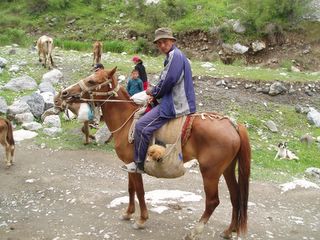They look up at you, two pools of brown painted on white globes socketed into a taut, dusty face. You can fall into those eyes and follow them to the end, but I rarely do. I quicken my pace and listen to the little feet shuffle as they try to keep up. For a moment, we compete for the same air and my own eyes tighten and fix on some imaginary point in front of me. In the seconds that our paths cross, my heart beats faster, I hear the pounding in my ears and I feel my ribs clench like fists around my lungs.
Guilt. Like most emotions, the physical manifestation of guilt plays itself out on the body of the one it inflicts. Some people try to buy their way out of this emotion, doling out money in hopes that those eyes don’t haunt their dreams. I have tried this, only to be swarmed by more children than bills in my wallet. There is no easy answer, no easy way out. “Experts” tell me not to give them money. “If you feel you must do something, buy them bread.” They say. I have not done this yet, but entertain the idea like a fantasy…The Newspapers will read: “American Philanthropist Feeds Every Child” or “Foreigner Solves Problem of World Hunger.”
Nonsense.
A deeper examination of the guilt I feel reveals my self-reflection on why I avoid the eyes of a beggar child. A simple homonym of truth: Human eyes…humanize. When I avoid their gaze by focusing on some point in front me, I reduce these children to something “other” than what they are. They become ghosts; unseen, unreal and inhuman. Their solicitous and woeful pleas are the floating, warbled “Wooooos” of apparitions. Their lithe, small frames become transparent and my physical reaction—the palpitating heart and shortness of breath—is similar to that of the lay-awake-child whose sheets are drawn up to his nose because he hears the haunted spirits hunting for him.
I, too, am afraid—afraid to face a reality more horrifying than a ghost tale. I walk this earth, love and laugh and dream, ignorant and unaware of the suffering of “others”. But my fear runs deeper than merely confronting my ignorance of an “other” world. I have felt this fear before, perhaps most poignantly in Munich, Germany, when I encountered a child with a chilling deformity.
It was at a place called “The Tent”, a backpackers haven where young adults from around the world convened to sleep-off their travel wearied souls. Nothing more than a circus tent guised as a youth hostel, “The Tent” is where I witnessed the walking corpse of a seven year old child, the skin around his bald head pulled tight against his skull. Two vertical slits substituted for his nose and the child’s entire lower jaw and chin were missing. This left his upper teeth jutting out over his body like one of Wright’s cantilevered homes teetering precariously over the edge of a cliff. But there was no beauty to the architecture of this boy.
He walked among us, one hand clinging to the fingers of his guardian (a man I later discovered brought him from Pakistan to Germany for reconstructive surgery)—his gaunt face, gawking at the healthy, white-skinned, wiry youth who stared back at him like he was a freak. He was there only one night, but his after-presence remained in the air like the contrails of a jet against a cerulean sky.
“I don’t want to sound mean, but I am glad that little kid is gone.” I remember one girl saying as a dozen others nodded in agreement. I remained quiet, feeling an unknown shame wash over me like mud. I wrote about it in my journal that night:
“That child’s deformed face reminded all of us of who we were; young, healthy kids prosperous enough to be traveling for leisure—trying to find “our selves”, instead of a new face. He plagued our camp and stole our innocent fun and we loathed him for reminding us that others were suffering. All of us were afraid of a little boy and ashamed of our fear.”
I wish I had written something different. I wish I had been brave enough to approach the boy, but I wasn’t. I have been haunted by the image of that child for a long time. What frightens me is how easy it is to fear an “other”—to turn people into phantoms of reality and to see through them by pretending they are not there. The image of that boy’s face was powerful. He could not be ignored and that scared everyone at The Tent.
Perhaps if I can just bring myself to look into the eyes of a beggar child—those human eyes—my fear will dissipate. Perhaps it will dissolve into the air like the ghosts of my youth and a child will remain.
Larry Tweed




